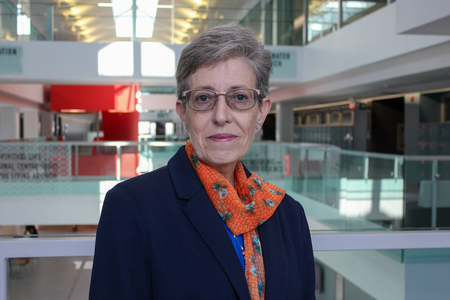IAHR Executive Committee 2025-2027 | Candidate Statement: Ana Maria Ferreira da Silva
Ana Maria Ferreira da Silva - Queen’s University, Kingston, Ontario, Canada
Candidate for:
Vice-President for the Americas
Biography
 Professor Ana Maria F. da Silva is a Full Professor and Head of the Department of Civil Engineering at Queen’s University in Canada. Born and raised in Portugal, she holds a B.Sc. in Civil Engineering (1985) from the University of Porto, Portugal, and a M.Sc. (1991) and Ph.D. (1995) from Queen’s University. She previously worked for the National Laboratory of Civil Engineering (LNEC), Lisbon, Portugal (1985-1989), the US Army Corps of Engineers Waterways Experiment Station in Vicksburg, Mississippi (1996-97), and the University of Windsor, Canada (1997-2000). Her main research interests are Environmental Fluid Mechanics, River Mechanics, and Large-Scale River Morphology and Morphodynamics. She has published extensively in these topics, and especially on large-scale bed forms, resistance to flow, and the hydro-morphodynamics of meandering rivers.
Professor Ana Maria F. da Silva is a Full Professor and Head of the Department of Civil Engineering at Queen’s University in Canada. Born and raised in Portugal, she holds a B.Sc. in Civil Engineering (1985) from the University of Porto, Portugal, and a M.Sc. (1991) and Ph.D. (1995) from Queen’s University. She previously worked for the National Laboratory of Civil Engineering (LNEC), Lisbon, Portugal (1985-1989), the US Army Corps of Engineers Waterways Experiment Station in Vicksburg, Mississippi (1996-97), and the University of Windsor, Canada (1997-2000). Her main research interests are Environmental Fluid Mechanics, River Mechanics, and Large-Scale River Morphology and Morphodynamics. She has published extensively in these topics, and especially on large-scale bed forms, resistance to flow, and the hydro-morphodynamics of meandering rivers.
She first got involved in IAHR activities soon after attending as a young researcher the 1989 IAHR Biennial/World Congress in Ottawa, Canada, and became a member in 2001. She has since served IAHR as secretary, chair and past chair of the Fluvial Hydraulics Committee (2001-2013), co-opted Council member (2007-2009), member of the Council Nominating Committees for the 2011, 2015, 2019 and 2021 Council Elections, Council Task Force 4 on Gender Equity (2016-2017), Council Task Force for review of the publications portfolio (2021-2022), John F. Kennedy Student Paper Competition selection panel (2009, 2013, 2015) and Awards Committee (2022-2023); she is currently serving as IAHR Vice-President. She organized River Flow 2022 as chair of the Local Organizing Committee. She is a Fellow of the Canadian Society for Civil Engineering and presently serves as an Associate Editor for the Canadian Journal of Civil Engineering.
Statement
I am deeply grateful to the Nominating Committee for proposing me for a renewed term of 2 years as IAHR Vice-President. This year IAHR reaches its 90th Anniversary, and the many events and conferences organized either directly by IAHR or under its auspices will transform also into occasions for us all to together celebrate nine decades of global leadership in hydro-environment engineering and research. IAHR was an extraordinary association when I first came in contact with it as a young researcher, and it is even more so now. In the meantime we have seen climate change and its effects crystalize into the biggest challenges of the 21st century, with the consequences of climate change on our water bodies from source to sea being compounded by population growth and urbanization – all leading to a plethora of water related issues emerging at various levels, from local to global. IAHR is more necessary than ever, and it has been an exciting journey to see the association, through its leadership and countless contributions from members, expand and revitalize itself to incorporate our present-day challenges. Much remains to be done and like any modern institution, IAHR needs constant attention so as to remain financially viable, relevant and vibrant. It has been a great privilege for me as Vice-President since September 2023 to contribute to the strategic and organizational development of IAHR. My main activities so far consisted of: 1- chairing the Finance Committee, while promoting the dialogue on activities and actions that will ensure financial stability and growth into the future; 2- support the development of the new Strategic Plan 2024-2027; and 3- contribute to the new awards framework. Being from the Americas region, it has also been and it will continue to be a great privilege to act as link between the association and the interests and aspirations of the members from Latin America, the Caribbean, USA and Canada.
Over the next two years, and motivated by my professional and personal experiences both inside and outside IAHR, I would also work towards:
Enhancing the active participation of young professionals, including young researchers and practitioners, at all levels within IAHR. This is an effort in which I have been involved in many ways over the years, and remains one of my primary areas of interest. However, I believe that we must also ensure that the relationship that is created between IAHR and undergraduate and graduate students when they first participate in an IAHR event or events flourishes into a lifelong connection with the association as they graduate and move on to academia, industry and government positions, and that IAHR remains fully beneficial to them irrespective of the path they decide to follow. A continuous dialogue with all stakeholders on what we need to do to ensure this is required, together with the implementation of well thought out actions followed by a monitoring of the results.
Increasing the value of the association to existing and future members, including practitioners.
Increasing gender equity and geographic diversity. While for me it has been an immense pleasure throughout the years to see increasing participation of women in IAHR and see women rise to leadership positions, the work in this area is never done, and in my experience it requires continuous commitment and efforts by the IAHR Executive Committee and the Council. If elected, I pledge to continue these efforts, together with efforts to increase participation from geographic areas under-represented within IAHR.